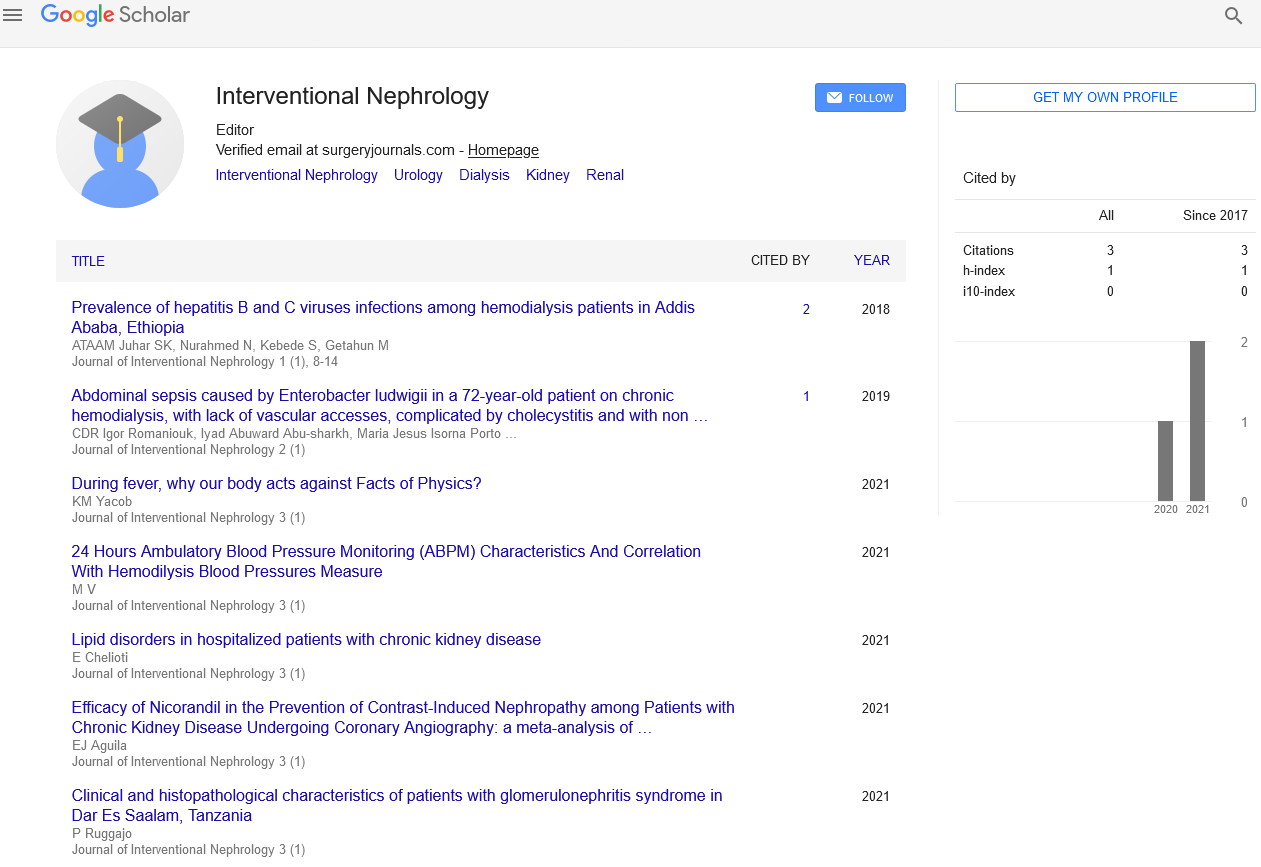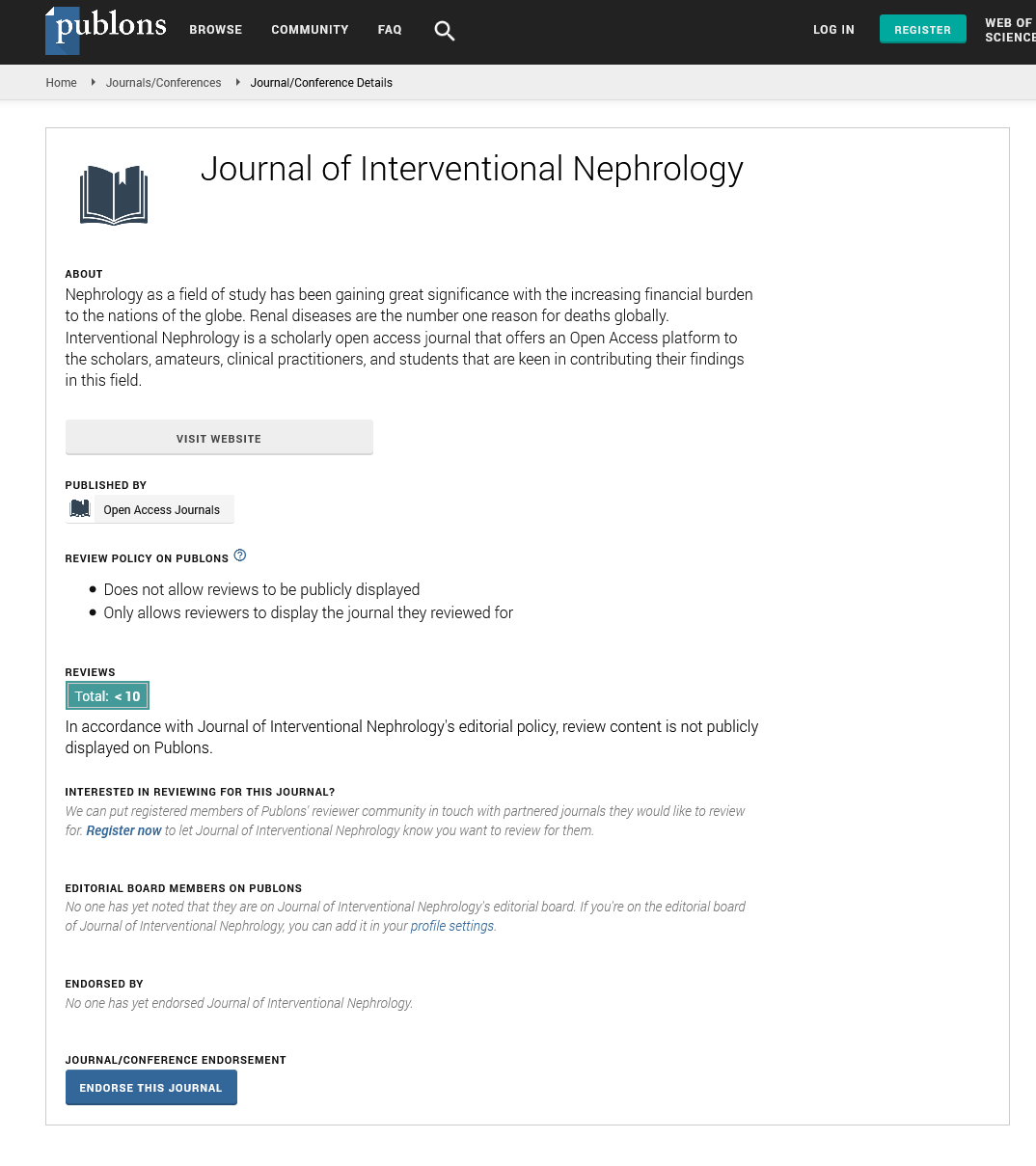Mini Review - Journal of Interventional Nephrology (2023) Volume 6, Issue 2
Review of Kidney Function and Disease
Dr. Mamata Mishra*
Department of Pharmacology, Kasturba Medical College, Karnataka, India
Department of Pharmacology, Kasturba Medical College, Karnataka, India
E-mail: Mamatamishra@gmail.com
Received: 01-Apr-2023, Manuscript No. oain-23-96238; Editor assigned: 04-Apr-2023, PreQC No. oain-23- 96238(PQ); Reviewed: 18-Apr-2023, QC No. oain-23-96238; Revised: 22- Apr-2023, Manuscript No. oain-23- 96238(R); Published: 28-Apr-2023; DOI: 10.47532/oain.2023.6(2).20-22
Abstract
Nephrology is a specialized medical field that focuses on the diagnosis and treatment of kidney diseases. Nephrologists play a critical role in managing kidney diseases and improving patient outcomes. This article outlines some of the advantages and disadvantages of nephrology. Some of the advantages include the vital role that nephrologists play in managing kidney diseases, the multi-disciplinary approach often used in nephrology, and the specialized training that nephrologists undergo. On the other hand, some of the disadvantages of nephrology include the limited focus of the field, the time-consuming treatments required for kidney diseases, and the high cost of treatment. Despite these drawbacks, the benefits of nephrology outweigh the disadvantages for many patients with kidney diseases.
Keywords
Nephrology • Kidney diseases • Advantages • Disadvantages • Multidisciplinary approach • Specialized training • Dialysis • Transplant surgery • Emotional toll
Introduction
Nephrology is a medical specialty that focuses on the diagnosis, treatment, and management of kidney diseases. It is a branch of internal medicine that deals with the functions and disorders of the kidneys. The kidneys are vital organs that are responsible for removing waste products from the body, regulating the balance of fluids and electrolytes, and producing hormones that control blood pressure and red blood cell production [1].
Nephrologists are medical doctors who have specialized training in the diagnosis and treatment of kidney diseases. They work in hospitals, clinics, and private practices to help patients who are suffering from kidney disorders. Some of the common kidney diseases that nephrologists treat include chronic kidney disease, glomerulonephritis, nephrotic syndrome, renal failure, and kidney stones. Chronic kidney disease (CKD) is a longterm condition that causes the kidneys to gradually lose their function. It is a progressive disease that can lead to kidney failure if left untreated. Nephrologists work with patients to slow the progression of CKD and manage its symptoms. Treatment may involve medications, lifestyle changes, and dialysis or kidney transplant in severe cases [2].
Glomerulonephritis is a type of kidney disease that affects the glomeruli, which are tiny blood vessels that filter waste products from the blood. It can be caused by infections, autoimmune disorders, or other underlying medical conditions. Nephrologists may use medications, such as corticosteroids and immunosuppressants, to treat glomerulonephritis and prevent further kidney damage. Nephrotic syndrome is a condition that occurs when the kidneys excrete too much protein in the urine. It can be caused by a variety of factors, including infections, medications, and autoimmune disorders. Nephrologists may prescribe medications, such as diuretics and corticosteroids, to treat nephrotic syndrome and reduce protein excretion [3].
Renal failure is a condition that occurs when the kidneys are no longer able to function properly. It can be caused by a variety of factors, including diabetes, high blood pressure, and kidney infections. Nephrologists may work with patients to manage the symptoms of renal failure and provide supportive care. In severe cases, dialysis or kidney transplant may be necessary [4].
Kidney stones are hard, crystalline deposits that form in the kidneys or urinary tract. They can cause severe pain and discomfort and may require medical treatment to be removed. Nephrologists may use a variety of treatments, including medications, shock wave therapy, and surgical procedures, to treat kidney stones [5].
In addition to treating kidney diseases, nephrologists also work to prevent them. They may provide guidance on lifestyle changes, such as diet and exercise, that can help improve kidney function and reduce the risk of kidney disease. They may also screen patients for kidney disease and monitor their kidney function over time to detect any changes or signs of progression [6].
Discussion
Nephrology is a specialized medical field that focuses on the diagnosis and treatment of kidney diseases. The kidneys play a vital role in filtering waste products from the blood and regulating fluid and electrolyte balance in the body. When the kidneys are not functioning properly, it can have serious consequences for a person’s health. Nephrologists play a critical role in managing kidney diseases and improving patient outcomes [7].
Nephrology is a specialized medical field that focuses on the diagnosis and treatment of kidney diseases. The kidneys play a vital role in filtering waste products from the blood and regulating fluid and electrolyte balance in the body. When the kidneys are not functioning properly, it can have serious consequences for a person’s health. Nephrologists play a critical role in managing kidney diseases and improving patient outcomes. One of the main advantages of nephrology is the vital role that nephrologists play in managing kidney diseases. By diagnosing and treating kidney diseases early, nephrologists can help prevent or delay kidney failure and improve patient outcomes. This is particularly important for patients with chronic kidney disease, which can lead to a range of serious complications if left untreated [8].
Another advantage of nephrology is the multi-disciplinary approach often used in the field. Nephrologists work closely with other healthcare professionals, such as dieticians, social workers, and transplant surgeons, to provide comprehensive and effective care to patients. This collaborative approach can lead to better outcomes for patients with kidney diseases. Nephrologists also undergo specialized training in the diagnosis and treatment of kidney diseases, which allows them to provide expert care to patients with these conditions. Additionally, advances in technology have greatly improved the diagnosis and treatment of kidney diseases in recent years, and nephrologists are at the forefront of utilizing these advances to improve patient outcomes [9].
However, there are also some disadvantages to nephrology. One of the main disadvantages is the limited focus of the field. Nephrology focuses solely on kidney diseases, which may limit the scope of care that nephrologists can provide to their patients. Patients with kidney diseases may require care for other health conditions as well, and may need to see other healthcare providers in addition to their nephrologist. Another disadvantage of nephrology is the time-consuming treatments required for kidney diseases. Dialysis and transplant surgery, two common treatments for kidney diseases, can be time-consuming and require frequent visits to healthcare providers. This can be a burden for patients and may limit their ability to work or participate in other activities. Treating kidney diseases can also be expensive, particularly for patients who require long-term dialysis or transplant surgery. The high cost of treatment may be a barrier for some patients who cannot afford these treatments. Finally, living with a chronic kidney disease can be emotionally taxing for patients and their families. The stress of managing a chronic condition, as well as the uncertainty of the future, can take a toll on a patient’s mental health and quality of life [10].
Conclusion
In conclusion, nephrology is a specialized medical field that focuses on the study and treatment of kidney function and diseases. Nephrologists work to diagnose and treat a variety of kidney disorders, including chronic kidney disease, glomerulonephritis, nephrotic syndrome, renal failure, and kidney stones. They also work to prevent kidney disease by promoting healthy lifestyle habits and providing regular screening and monitoring for at-risk patients. If you or someone you know is experiencing symptoms of a kidney disorder, it is important to seek medical attention from a qualified nephrologist to receive the best possible care and treatment.
Acknowledgement
None
Conflict of Interest
None
References
- Roncone D, Satoskar A, Nadasdy T et al. Proteinuria in a patient receiving anti-VEGF therapy for metastatic renal cell carcinoma. Nat Clin Pract Nephrol. 3, 287-293 (2007).
- Bollée G, Patey N, Cazajous G et al. Thrombotic microangiopathy secondary to VEGF pathway inhibition by sunitinib. Nephrol Dial Transplant. 24, 682-685 (2009).
- Izzedine H, Brocheriou I, Deray G et al. Thrombotic microangiopathy and anti-VEGF agents. Nephrol Dial Transplant. 22,1481-1482 (2007).
- Robinson ES, Matulonis UA, Ivy P et al. Rapid development of hypertension and proteinuria with cediranib, an oral vascular endothelial growth factor receptor inhibitor. Clin J Am Soc Nephrol. 5, 477-483 (2010).
- Cippà PE, Schiesser M, Ekberg H et al. Risk stratification for rejection and infection after kidney transplantation. Clin J Am Soc Nephrol. 10, 2213-2220 (2015).
- Loupy A, Vernerey D, Tinel C et al. Subclinical rejection phenotypes at 1 year post-transplant and outcome of kidney allografts. J Am Soc Nephrol. 26, 1721-1731 (2015).
- Said SM, Sethi S, Valeri AM et al. Renal amyloidosis: origin and clinic pathologic correlations of 474 recent cases. Clin J Am Soc Nephrol. 8: 1515-1523 (2013).
- Nuvolone M, Merlini G. Systemic amyloidosis: novel therapies and role of biomarkers. Nephrol Dial Transplant. 32, 770-780 (2017).
- Dember LM. Amyloidosis-associated kidney disease. J Am Soc Nephrol. 3458-3471 (2006).
- Lachmann HJ, Booth DR, Booth SE et al. Misdiagnosis of hereditary amyloidosis as AL (primary) amyloidosis. NEJM. 346,1786-1791 (2002).
Google Scholar, Crossref, Indexed at
Google Scholar, Crossref, Indexed at
Google Scholar, Crossref, Indexed at
Google Scholar, Crossref, Indexed at
Google Scholar, Crossref, Indexed at
Google Scholar, Crossref , Indexed at
Google Scholar, Crossref, Indexed at
Google Scholar, Crossref, Indexed at
Google Scholar, Crossref, Indexed at


